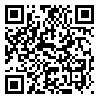BibTeX | RIS | EndNote | Medlars | ProCite | Reference Manager | RefWorks
Send citation to:
URL: http://journal.zums.ac.ir/article-1-2147-fa.html
Background and Objective: low-value junk food consumption due to the large amount of salt, fat and sugar, prepare chronic diseases (heart diseases - cardiovascular, obesity, and hypertension) in adult age. This study has been designed to investigate the effect of health education methods on students' knowledge and practice of nutrition in junk food consumption. Materials and Methods: This quasi-experimental study was carried out on 618 (the fifth grade) elementary school students in regions 1 and 2 schools of Sanandaj in 1391-1390 academic year. 246 students were in the film show group, 204 students in lecture group and 168 students in control group. In film group, a film was showed 45 minutes for students. In lecture group, in order to follow similarity a text of the same content which showed in the film prepared and presented for 45-minutes by health expert. Students in the control group did not receive any training. Knowledge and practice of students was measured by questionnaires which included demographic questions, Knowledge questions and practice questions. Results: The sample age was 10 to 12 years with average 11.07 ± .58.46 percent of the population were female and 54 percent were male. The results showed that Knowledge and practice on junk food consumption in three groups after training had a significant difference (P = 0.0001), also in lecture and show film groups before and after intervention there was a significant difference (p = 0.0001). The Knowledge and practice of the control group was not significant before and after training. Conclusion: The results showed the positive effect of indirect educational methods (showing film) on practice on junk food consumption and also revealed that the impact of showing film is greater than the lecture.
دریافت: 1392/2/18 | پذیرش: 1393/3/31 | انتشار: 1393/3/31
| بازنشر اطلاعات | |
 |
این مقاله تحت شرایط Creative Commons Attribution-NonCommercial 4.0 International License قابل بازنشر است. |




